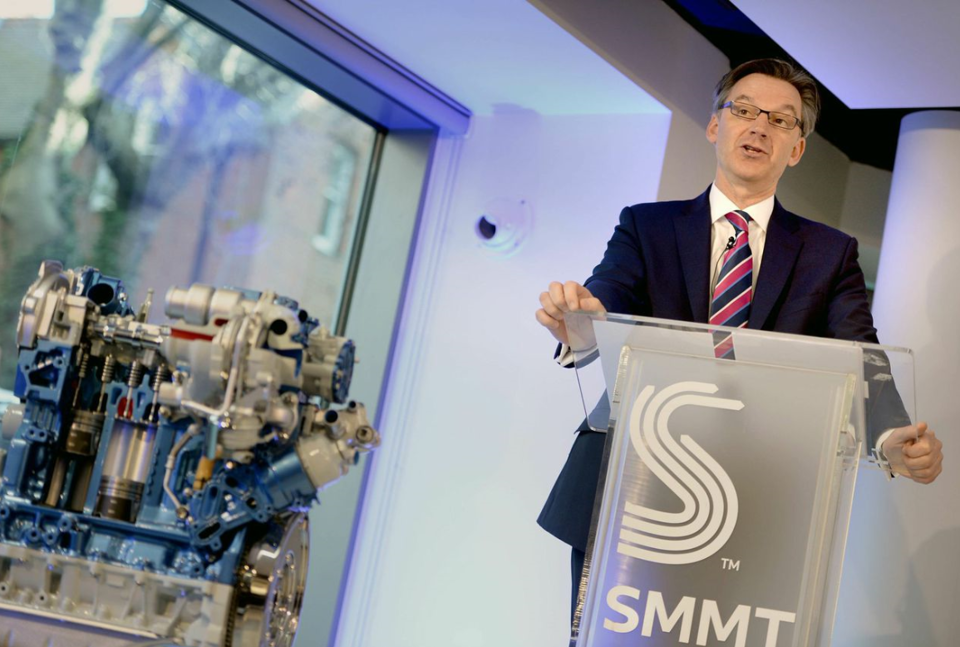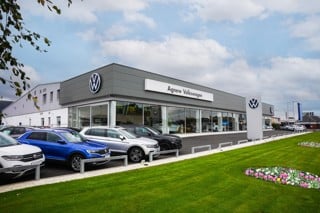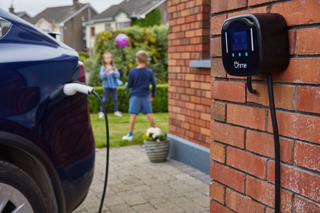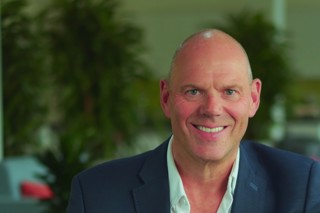The SMMT has praised the government’s drive towards improved transport infrastructure and innovation in the EV sector following yesterday’s Autumn Statement as others eyed opportunity amid the uncertainty.
But will the organisation’s chief executive, Mike Hawes, praised many of the steps taken by the Chancellor, Philip Hammond, other were more cautious about the economy’s immediate future in light of increased borrowing and a slow-down in the plan to balance the nation’s books.
Hawes (pictured) said that he welcomed the government’s commitment to improving infrastructure and investment in R&D, an area in which “UK automotive punches above its weight”.
And in a comment which followed yesterday’s statement, he added: “One of the main areas in which UK Automotive is playing a leading role is the development and introduction of low emission and connected and autonomous vehicles.
“The Chancellor’s announcement of £390 million will help promote our competitive advantage in these fields. We welcome the investment to enhance the charging network for electric vehicles, as well as further support to boost uptake of low emission buses and taxis.
“Furthermore, the commitment to connected and autonomous vehicle testing infrastructure is an area in which the UK is already one of Europe’s leading centres.”
Hawes said that the commitment to autonomous vehicles “has the potential to transform lives” by preventing more than 25,000 accidents and creating more than 320,000 new jobs.
He said that he was disappointed not to see more business rate reform, however, having called for the removal of plant and machinery from business rates valuation, and said that further measures were needed to support competitiveness in the supply chain of both automotive and other key sectors.
Also responding to the Autumn Statement, Rupert Pontin, Glass's director of valuations, said: “The Chancellor has underlined how tricky the next few months and years are likely to be because of the economic turbulence created by the Brexit vote.
“While the underlying strength of the economy is pretty good, at least in comparison with other, similar countries, we are entering a period where growth will slow, inflation will rise and borrowing will be higher. None of these things are good for the general economy and are certainly not encouraging signs for the motor or fleet industries or for private or business motorists. These are going to be reasonably unpredictable times.”
Pontin did praise the chancellor’s introduction of a capital allowance to support the installation of EV chargers, however, adding: “It seems pretty clear that the Government envisages us driving around in largish numbers of electric and advanced hybrid vehicles within five years which, in our view, is a good match for the rate of development of EV technology. This will probably help to power new car sales.”
James Broadhead, chief executive of Close Brothers Motor Finance, feels that rural car dealers would be the real winners following yesterday’s statement, having identified tax relief for rural business rates as a key new policy. He said: “Today’s reforms to rural business tax rates will come as a welcome relief to small and medium-sized businesses.
“Increases to the national living wage and pension auto-enrolment have burdened small businesses nationwide, and so this tapered and measured business rate relief for rural areas will go a long way in ensuring their future prosperity.
“We work with many car-dealerships in rural regions across the country and we understand the challenges they face on a day to day basis from changes to regulation. Today they can feel positive about a change that should improve local business confidence and inspire growth in the economy.”
Paul Burgess, the chief executive of Startline Motor Finance, concluded that the UK was “not doing too badly at all” after hearing the chancellor’s plans, which outlined £120 billion of extra borrowing by 2020/21 and scrapped targets to bring the nation’s budget into surplus.
He said: “What does this mean for the motor finance sector? Well, people generally are likely to have less money in their pockets and perhaps even face greater uncertainty over their future employment prospects.
“Over a period of time, this could potentially have an impact on the shape of the market. Fewer borrowers are likely to meet the requirements of prime lenders and, as we have long been predicting, the market could become more sophisticated, with a broader spread of motor finance providers offering a clearly signposted, broader spread of risk appetites.”
Burgess said the unsettled times could spell opportunity. He said: “This is something that actually presents opportunities for informed dealers. By creating a lender panel that reflects this change, you will be in a position to present your customer with a wider range of motor finance choices in a responsible and transparent fashion, allowing them to make a highly informed buying decision. This would be a positive development for used car buyers and, of course, used car sellers, too.”
James Tew, CEO at iVendi, said that dealers need to be working hard to exploit every opportunity in the current climate. He said: “From an iVendi point of view, we were interested to see the investment that is being committed to 5G communications network development.
“Mobile devices are very much the most popular means by which buyers search for new and used cars - so faster, more reliable Internet access, wherever you are, is good news for dealers.”
Ian Simpson, European managing director – automotive, The Warranty Group, said that economic uncertainty would breed “demand for products that offer a high degree of peace of mind and budgetary certainty”, meanwhile.
He added: “Dealers who understand this desire on the part of used car buyers should aim to meet this need. It is about constructing a used car proposition that offers a high degree of certainty, confidence and trust.”
James Broadhead, chief executive of Close Brothers Motor Finance, said: “Today’s reforms to rural business tax rates will come as a welcome relief to small and medium sized businesses. Increases to the national living wage and pension auto-enrolment have burdened small businesses nationwide, and so this tapered and measured business rate relief for rural areas will go a long way in ensuring their future prosperity.
“We work with many car-dealerships in rural regions across the country and we understand the challenges they face on a day to day basis from changes to regulation. Today they can feel positive about a change that should improve local business confidence and inspire growth in the economy.”
James Fawcett, partner at Gordons law firm, said on the increase in national living wage from £7.20 per hour for over 25s to £7.50 per hour: "This increase could pose another headache for the dealerships less than eight months since the national living wage was first introduced.
“Many employers spent those first few months assessing the impact of increased staff costs and although there has been an element of restructuring, the general feeling was that the new national living wage was still only a small increase on the minimum wage in place. Now they are faced with another 30p increase from April and only time will tell the impact this will have on employers.
“Of course, critics will argue it’s still not enough. It is worth noting that the minimum wage increased every year and it was to be expected that national living wage would do the same. In fact, the new figure is less than the £7.64 that had been already been suggested by the Low Pay Commission.
“It is also significant that even with this increase the Government’s national living wage is still almost £1 lower than the voluntary living wage, which is set by the Living Wage Foundation, for employees outside of London and £2.25 lower for those in London.”



















Login to comment
Comments
No comments have been made yet.